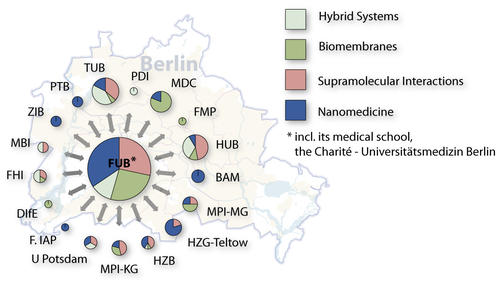Network
Nanoscale organizes collaborative research on nanosystems
The FU Focus Area NanoScale supports collaborative research efforts with focus on materials and their properties at the nanometer range, initiated by or with participation of FU scientists. A wide range of disciplines contributes to these efforts. As defined by the individual project, molecular biosciences, chemistry, informatics, mathematics, medicine, pharmacology, and physics are involved. Experimental and theoretical groups interact closely in aiming at interdisciplinary approaches to novel materials and exciting molecular and physical processes. In close collaboration, new and improved experimental procedures and instrumentation are being developed.
NanoScale projects are organized in research areas
Research in the Focus Area is structured in areas that serve as nuclei for strong research foci. From within these areas, NanoScale supports the application process for collaborative research centers or other third party funded research projects. Over the last years, NanoScale financially and organizationally sponsored explorative, ideally interdisciplinary research projects (Brückenprojekte) to explore the feasibility of a concept or to start a project intended to become part of a collaborative research initiative. The financial and organizational support of junior researchers is another important aspect of the Focus Area NanoScale.
NanoScale is based on collaborative research networks at FU …
NanoScale relies on existing and past research efforts and collaborative research structures playing to the strength of the research fields that are established at the FU since many years. These are – among others – for example collaborative research centers (SFBs) of the German Research Society (DFG) on biomembranes, subcellular functional modules, processes at interfaes, or the chemistry of multivalent molecules and their interactions.
Currently, all NanoScale research areas are linked to collaborative research consortia of Freie Universität Berlin, e.g. the collaborative research centers SFB 958 "Scaffolding of Membranes" (Biomembranes), SFB 1078 “Protonation Dynamics in Protein Function” (Supramolecular Interactions, Biomembranes), SFB1349 ""Fluorine-Specific Interactions" (Supramolecular Interactions), and the new SFB1449 "Dynamic Hydrogels at Biointerfaces" (Supramolecular Interactions, Biomembranes).
… and in the Berlin area
Although fundamental expertise in the diverse nanosystems is established at the FU, successful advances in the scientific fields served by NanoScale are not conceivable without strong connections to research groups of Charité Universitätsmedizin Berlin, Humboldt-Universität Berlin, Technische Universität Berlin, the University of Potsdam and non-university institutions like Helmholtz-Zentrum Berlin, Helmholtz-Zentrum Geesthacht, Deutsches Institut für Ernährungsforschung (DiFE), Fritz-Haber-Institut of the Max-Planck-Society, Konrad-Zuse-Institut Berlin, Leibniz-Institut für molekulare Pharmakologie (FMP), Max-Delbrück-Center for Molecular Medicine (MDC), and the Max-Planck-Institutes for Colloids and Interfaces and for Infection Biology as well as institutes like the Federal Institute for Materials Research and Testing (BAM) and the Federal Institute for Risk Assessment (BfR).
Although most projects are still in the realm of basic research, strong links to applied research are established, where applicable. Collaborations exist between individual researchers and companies like mivenion, RiNA or Bayer HealthCare.


